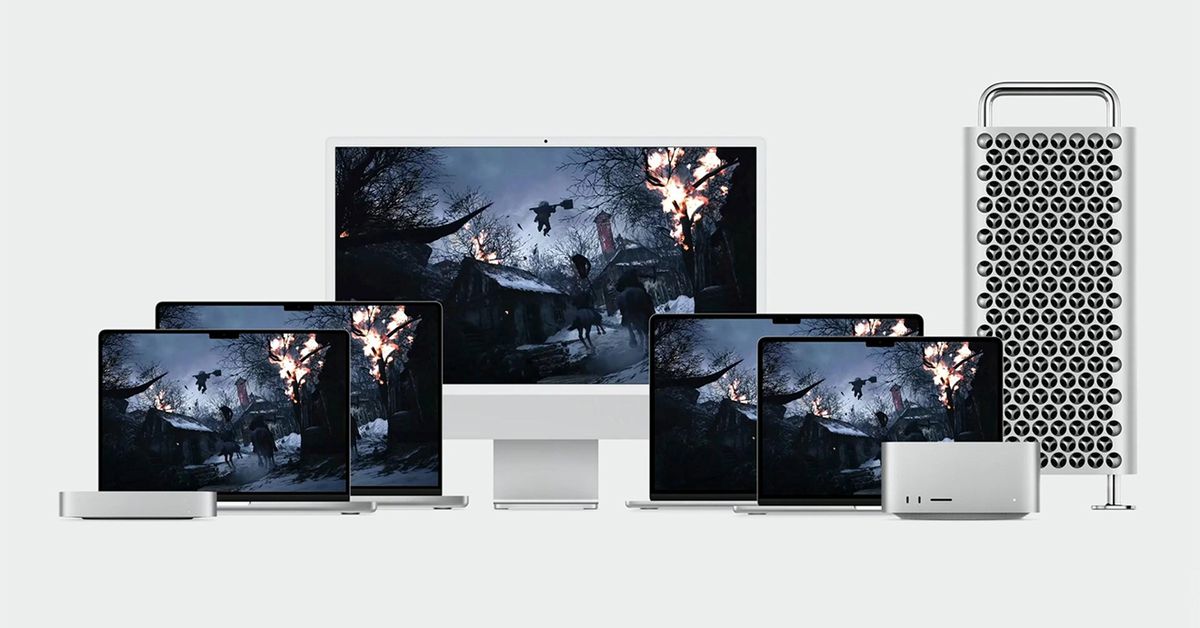- cross-posted to:
- apple_enthusiast@lemmy.world
- tech@partizle.com
- cross-posted to:
- apple_enthusiast@lemmy.world
- tech@partizle.com
“Apple has created a new Game Porting Toolkit that’s similar to the work Valve has done with Proton and the Steam Deck. It’s powered by source code from CrossOver, a Wine-based solution for running Windows games on macOS. Apple’s tool will instantly translate Windows games to run on macOS, allowing developers to launch an unmodified version of a Windows game on a Mac and see how well it runs before fully porting a game.”
The new software will allow Mac users* (see edit) to play ‘Windows games’ on their Apple silicon (M1/M2) devices. With development, this has the potential to bring gaming to Apple.
*EDIT: The Game Porting Toolkit is designed for developers to see how their game performs on Apple silicone to entice devs to create native ports. Thanks to commenters for pointing out this distinction. The CrossOver project on which it is built, I believe, is designed for end-users to run software on their Mac clients.
I want to see Apple contributing more to the open-source CrossOver project, both in terms of code and financing. Their contribution has been minimal and Apple’s audacity in essentially repackaging open-source software is disgusting to me. Please correct me if I’m wrong.
You are not wrong. But this isn’t even like proton, it’s not for end users. It’s intended for developer testing, so they can get an idea how well it runs on a mac, and then somehow be persuaded to do a proper mac port??
Exactly this. After seeing what proton can do on Linux, devs will probably just wait and hope apple gets on that level.
I’d love for that to happen but I believe Apple wants all the games in the App Store so they get 30% cut, rather than giving that cut to steam.
If that’s what they want, Steam’s existence on macOS as well as games being available for purchase through both the App Store and Steam aren’t working in their favor in that regard. But between the App Store and those previous attempts to block out Game Pass, hopefully Apple will see an opportunity to ensnare more users to the ecosystem.
How many folks out there have iPhones but don’t have Macs because of weird hangups like “no games”? They’ll target this group eventually.
I’m personally about to exactly be in this category. I am moving from Android to iPhone, and will not be getting a MacOS device for my primary computing until MacOS gets good Gaming Support.
Namely Guild Wars 2 and Warframe. But, other games would be really nice.
My thoughts exactly. Apple is a public company, they’re not investing in software that’ll put money in other companys’ pockets.
If you look at what was also announced, it reads pretty clearly as they needed a solution for porting to and developing for their new VR headset.
Definitely. Apple doesn’t pour much resources into mac gaming because they make barely anything off it. It may change though, because I’m sure they’ll try to push it with their closed down goggles, which run mac / ios architecture.
Well, see how it runs on Mac in its current state. I’m sure that without Translation Layers, the games would run significantly better. I need to personally try the new No Man’s Sky Apple Silicon port on my Wife’s M1 MacBook Air.
How good is crossover? Would you recommend it?
This isn’t Proton-like, this IS Proton. Proton is what Valve call their WINE version. Codeweavers actively build WINE and give it away and they’ve looked at the Apple code and it IS WINE.
You’re welcome Apple! Assholes. Least you could do would be to contribute, but then the magic is taken away from your dictatorship isn’t it? Can’t have that.
You are mostly correct, but from my understanding the “Game Porting Toolkit” system isn’t just the CodeWeavers’ WINE part but also includes the Rosetta x64 to ARM translator and the D3DMetal translation layer as well. So through those layers many instructions can fall through the cracks.
All in all, neat that games can even be played on a Mac in the first place, but you still get relatively bad performance, restrictive licensing on use, worse compatibility than Proton. That’s living in Apple’s wonderful walled garden, for ya.
Eh, this doesn’t sound anywhere near as impressive as what Valve did for Proton itself. First of all, Proton is actually good to the point where native linux ports aren’t even needed (although appreciated), its not just for dev prototyping.
And as the top post said, Apple’s fork of CrossOver is not public. Pretty expected from Apple by this point.
Similar, but not the same, to proton. Few games will work well enough to be playable off the bat. Most will still require porting work be done by the developer, to bring the game to a point that’d be considered playable.
Much like how the “linux-support” of many game engines went unused, I’m sceptical. The reason proton has been so successful is that it has been able to get the ball rolling with zero or near-zero work input required from the devs of the games it has brought to linux. This has give linux gaming enough of a start that putting in the work becomes more appealing in the cases where it is needed.
Just putting out the tools and telling devs, “use them” may not be enough to get mac gaming back on track.
They’re also not giving them the tools, they’re not allowed to use them for the final product, just to get a feel of how the game would run on the hardware if they port it 💀
Then its even worse than I thought. This is a total nothingburger.
The Steam Deck was also gave Proton a huge boost in visibility thanks to Valve’s Steam Deck ready branding, which is something only Valve could do thanks to them having control of Steam. Apple will need to figure out a way to similarly boost visibility for Mac compatible/playable games that isn’t just putting them on the Mac App Store (which I can’t remember using for anything other than an update in months).
Additionally, Valve also does work themselves to push the list forward. The catalog needs to exist first if they want gamers to move and the devs won’t put in the work without the market.
Valve saw that and did work to ensure tons of games would work on the Deck with no effort on the part of the devs. If Apple isn’t going to put in more effort then I don’t see how this succeeds.
And Linux gaming is already here for years now ;)
I know it’s been a joke for as long as I can remember, but I really think this year (or last) was the year of the Linux desktop. All the work done on proton has seemed to bring lots of gamers over who were tired of Windows bs.
And the year of Linux desktop is happening any day now. I remain skeptical that this is enough to get any real gaming user base on Mac but I’m all for being proven wrong over time.
The Steam Deck runs Linux and is fairly mainstream, so if by “year of the Linux desktop” you mean “year of the Linux gaming platform”, that already happened.
For real. Most macs won’t even be able to run anything too intensive from modern times. Anything indie-ish that can run well on the hardware will likely be made in unity will already have a native executable
I’m actually excited for this.
Not expecting much of the latest AAA games being ported over, but excited for older games, that are either broken when Mac abandoned 32-bit, or titles that could have been ported over but didn’t because Apple didn’t care much about gaming.
Also I wonder if this porting toolkit could help with the development of emulators. Citra had issues with Mac, and even now OpenEmu is having issue with the shaders.
The tools for this are interesting. But I think the headline was slightly misleading to be called a Proton-like tool. This is more of a diagnostic tool than a translation layer to play games for troubleshooting than anything else. Even maxed out M2 Ultra devices are only getting like 30-40 FPS on Cyberpunk because of how many resources the tool uses. I personally hope it does incentivize some devs to port to macOS as a primary Mac user. Devs need to see a cost benefit to do it. Apple convincing one dev per year to port a AAA game to Mac is not enough of an effort to actually convince people of anything.
That being said, Apple has had very inconsistent messaging regarding gaming in the past. And Steve Jobs notoriously did not care for gaming. Really, the only gaming success they are having right now is mobile games. And despite on/off rumors of a dedicated gaming device. I would just not be encouraged based on the majority of offerings on Apple Arcade that there would be much worthwhile. The only reason I even have it is because my phone plan includes it. Otherwise I would never touch it.
If i understood right, apple is licensing crossover which is a paid fork of wine, so imho it can be compared to proton, which is a gaming oriented fork of wine
It’s actually an issue with the ultra chip
That was informative. Thank you! It makes me actually want to experiment. It sounds like the best results are on Sonoma. But I’ve heard some of the glitches with the software are not in a tolerable state yet. But I’ll try the beta when it goes public or when I feel confident about the stability.
This is so exciting to see, as the “Gaming on a Mac!?” argument has been a “chicken or the egg” problem for the Mac ecosystem for decades. You know how it goes, “Publishers don’t want to release games for Mac because the user base isn’t there” versus “The user base isn’t there because there aren’t games for Mac”.
This toolkit is a significant step in the right direction that can cut down on porting times for games. And the folks who’ve tested out games have been surprised at the performance without ports. Macs may finally get a market out of this :)
When I read this headline I thought of when I bought my first mac in 2006 when they switched to Intel. They also thought that’d bring over games, and it didn’t. “Mac gaming is right around the corner” feels a little like “this is the year for Linux on the desktop.”
I’m not saying it’ll never happen. But it’s definitely a wait and see situation.
MetalFX upscaling is a nice gesture, but turned out to be a lousy performance-quality tradeoff comparable to FSR 1.0. Apple Arcade had some nice gems like fantasian, but also ended up a recycling bin for failed f2p games. We can only assume the monkey’s paw will curl some way or other for this, too. Apple’s attempts to get gamers to buy their stuff is always a little half-assed.
If they end up contributing upstream, great and I see no issue. If not, a bit scummy, but its Apple we are talking about, so thats to be expected :)
“The new Game Porting Toolkit provides an emulation environment to run your existing unmodified Windows game and you can use it to quickly understand the graphics feature usage and performance potential of your game when running on a Mac,”
So this is a real-time translation layer similar to how rosetta works? If this is working already and assuming that it works well, why would developers spend time making a native port when this is free and It Just WorksTM
why would developers spend time making a native port when this is free and It Just Works
Sadly it’s not. IIRC:
First, the main part of this toolkit is to create an automated translation from DirectX 12, including the metal shader equivalents. However since the instructions / shades automatically generated, they are highly inefficient. Thus, they perform sub par (low framerate, buggy), and require developers to polish them, optimize them according to the machines. But large part of the job is done for them, at least for testing.
Second, currently, in order to run those games, you need to download the exe file of the game, download dependencies, and run many commands manually from terminal, it’s not user friendly at all. Also, it requires user to buy the Windows version of the game in the first place, thus the need to download windows version of steam, etc, etc.
Ahh thanks for the context. I guess something like this can never be that easy, especially with the custom silicon that apples running now
Still need to have people who want to game on mac
Hey, I might actually play starfield now!
Could’ve done it through Gamepass streaming as well, but playing locally is always the preferred option.














